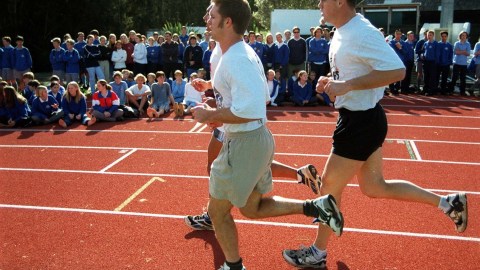Working out regularly boosts appetite for healthier foods, new research suggests

Photo credit: Phil Walter / Getty Images
- The study examined the dietary choices of students who were asked to begin regular workouts over a 15-week period.
- Although students were asked not to significantly change their diets, most began choosing healthier foods.
- Interestingly, the types of foods they chose seemed to be associated with the intensity and lengths of their workouts.
Many people want a healthier lifestyle, but working toward one can seem daunting because it usually involves simultaneously changing two sets of habits: diet and exercise. However, new research suggests regular exercise might be all you need to get both on track.
A new study, published in the International Journal of Obesity on January 18,asked 2,680 college students, who weren’t exercising regularly, to start doing aerobics workouts out for 30 minutes three times a week, for 15 weeks. The researchers also asked the participants to track what they ate each meal, but did not ask them to change their diets.
The participants did anyway: During the 15 weeks, the students generally ate more fruits, vegetables and low-fat foods, and less fried foods and soft drinks. They also ate less food overall. Why this happened is unclear, though past studies have suggested that exercise might stimulate the production of appetite-regulating hormones.
Of course, the reason might also be that people who exercise regularly don’t want unhealthy food to hinder their ability to work out, or maybe they avoid eating unhealthy food because it’d make their workouts seem like a waste. There’s also a phenomenon known as the transfer effect, which describes how the new skills or attitudes learned in one behavior can carry over to a second behavior.
Whatever the cause, the existence of a link between routine exercise and diet seems clear.
“The process of becoming physically active can influence dietary behavior,” Molly Bray, corresponding author of the paper and chair of the Nutritional Sciences department at UT Austin and a pediatrics faculty member at Dell Medical School, told UT News. “One of the reasons that we need to promote exercise is for the healthy habits it can create in other areas. That combination is very powerful.”
It’s worth noting that the participants in the study were college students, some of whom might have never given much thought to adopting a deliberate exercise or diet plan.
“Many people in the study didn’t know they had this active, healthy person inside them,” Bray said. “Some of them thought their size was inevitable. For many of these young people, they are choosing what to eat and when to exercise for the first time in their lives.”
Different workouts, different eating habits
Overall, regular exercise was followed by generally healthier eating habits in most of the participants. But interestingly, the study found patterns between the length and intensity of workouts and what participants chose to eat. First, the researchers described several dietary patterns, summed up as:
- Western: corn, soft drinks, cheeseburgers, steak, bacon, butter, hot dogs, pizza
- Prudent: tuna, non-fried fish, fruits, coffee, peanut butter, eggs, tomatoes, greens
- Ethnic: refried beans, pinto beans, tortillas, tacos, salsa
- Snacking: cookies, salty snacks, ice cream, sake, 100 percent juice, donuts
- Milk and cereal: Two percent or whole milk
The study found that longer workouts were associated with “restraining dietary preferences in the snacking and Western patterns, while a higher intensity of exercise induces an increased preference for the prudent pattern.” Also, and perhaps unsurprisingly, the results showed that participants who didn’t stick closely to the prescribed exercise routine were also less likely to make healthier changes to their diet over the 15 weeks.
Still, the researchers cautioned against drawing too many conclusions from their results, namely because: participants self-reported data; participants were self-selected, meaning they might’ve already been more interested in improving their health behaviors; and the overseers didn’t follow up with the subjects after the study intervention to see whether the dietary changes had persisted.
Nevertheless, for whatever still unknown underlying reason, the students, overall, did eat healthier when simply asked to exercise regularly…





